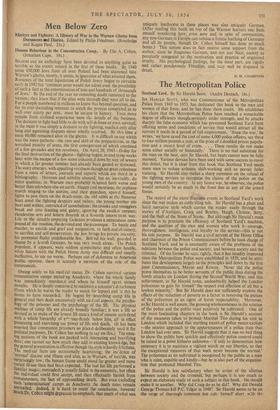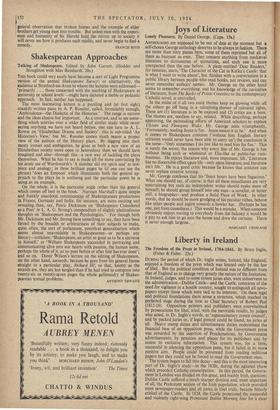The Metropolitan Police
Scotland Yard. By Sir Harold Scott. (Andre Deutsch. 16s.)
SIR HAROLD Scone who was Commissioner of the Metropolitan Police from 1945 to 1953, has dedicated this book to the men and women of that force, and he has done them credit. He establishes his claim that the Metropolitan Police have reached a remarkable
• degree of efficiency thougheseriotisly under strength, and he attacks sharply the false economy which has prevented Scotland Yard from offering terms and conditions of service that would attract all the recruits it needs in a period of full employment. 'Since the war,' he writes, `we have saved the cost of some 4,000 police officers, say three to four million pounds a year, at the price of a doubled prison popula- tion and a record level of crime. . . . These results do not make sense either socially or financially.' There is no real substitute for the man on the beat, says Sir Harold, but beats cannot now be fully manned. Various devices have been used with some success to cover this defect, but it is clear from this book that Scotland Yard needs more men to reduce arduous shift-working and to permit fuller training. Sir Harold also makes a sharp comment on the refusal of the fighting services to recognise the claims of the police on the young men of the country. In any future war, he observes, the police would certainly be as muchin the front line as any of the armed forces.
The record of the more dramatic events in Scotland Yard's work since the war makes an enthralling tale. Sir Harold has a plain and lucid narrative style which carries the reader easily through the stories of d'Antiquis, Craig and Bentley, Haigh, Christie, Setty, and the theft of the Stone of Scone. But although Sir Harold's main purpose is to proclaim the efficiency of Scotland Yard's machine, and the qualities of the men and women who work it—courage, thoroughness, intelligence, and loyalty to the service—this is not his sole purpose. Sir Harold was a civil servant at the Home Office and chairman of the Prison Commissioners before he took charge of Scotland Yard, and he is constantly aware of the problems of the relations between the police and society, and between society and the criminal. Of the former he says, rightly, that it has steadily improved since the Metropolitan Police were established in 1829, and he attri- butes this development largely to the principles laid down by the first joint Commissioners, Mayne and Rowan. Never did the police prove themselves to be better servants of the public than during the bomb attacks on London during the Second' World War, and this achievement, as Sir Harold notes, undoubtedly helped the London policeman to gain for himself 'the respect and affection of all but a lawless minority.' But Sir Harold does not sufficiently explore the effects of the reduction of poverty as a factor in removing the picture of the policeman as an agent of harsh respectability. Moreover, as Sir Harold is well aware, the growing wholesomeness in the relation of the police and the public must positively be cultivated. One of the most fascinating chapters in the book is Sir Harold's account of the measures taken to protect Marshal Tito during his visit to London which included that startling escort of police motor-cyclists —the nearest approach to the appurtenances of a police state that London had ever seen. Sir Harold suggests that it was no bad thing;. to show the public how quickly and effectively police control could be raised to a point hitherto unknown—'if only to demonstrate how. necessary it is to maintain a vigilant watch on our liberties, so that the exceptional measures of that week never become the normal' The policeman as an individual is recognised by the public as a man who is calm, capable and kindly—but he is also part of the organisa- tion that protected Marshal Tito. general observation that broken homes and the example of elder brothers get young men into trouble. But unless men with the experi- ence and humanity of Sir Harold hold the mirror up to society it will never see how it produces such misfits, and never begin to find a



































 Previous page
Previous page